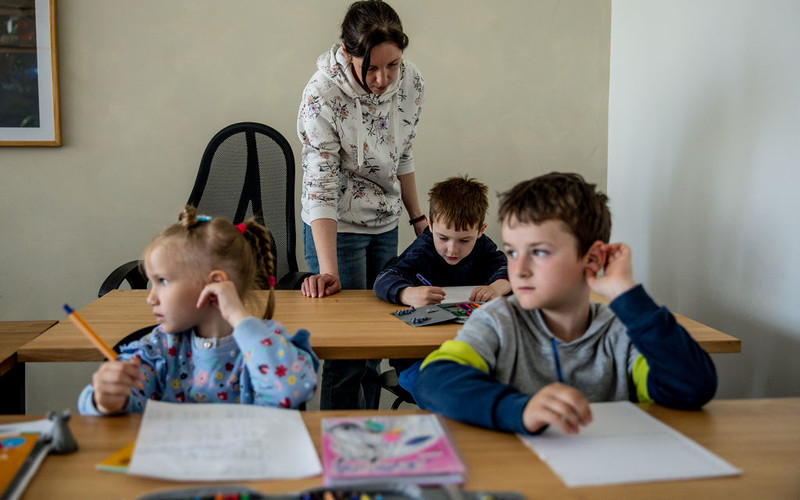The Center for Citizenship Education has published a report on the study “Young people face the global challenges of 2022” on World Refugee Day. The study identifies four thematic areas: global challenges, identity, migration, and climate.
Among other things, the survey asked about attitudes towards refugees from the Middle East and Ukraine. As we can read in the report, children and adolescents generally exhibit lower levels of social distancing than adults.
Respondents were asked, among other things, whether they would agree if a refugee from Ukraine wanted to live in Poland, work in Poland, study in a Polish school, live in your city, on your street, study in your school, in your class, be your friend. , make friends with you. “Young people have a positive attitude towards the presence of refugees from Ukraine in various spaces: both private and public” – it is indicated.
83.0 percent of respondents answered positively the question whether they would agree that a refugee from Ukraine would like to live in Poland, 4.3% answered negatively, 12.8% had no negative opinion. When asked about taking a job in Poland, 82.4% answered positively, 5% negatively, and 12.7% had no opinion. When asked about starting education in Polish schools, 84.9% answered positively, 3.5% negatively, and 11.5% had no opinion.
Questions also concern readiness to interact with students from Ukraine, incl. willingness to help study, learn a few words in Ukrainian, to get to know Ukrainian culture.
74.7 percent of respondents answered positively the question – if a refugee from Ukraine showed up in their class, would they sit on the same bench with him, 6.7% answered negatively, 18.5% had no negative opinion. When asked if it would help him in his studies, 80.4% answered positively, 4.7% negatively, and 14.9% had no opinion.
When asked if they would learn a few words in Ukrainian, 80.6% answered positively, 7.6% negatively, and 11.9% had no sentences. When asked – if they want to know Ukrainian culture – 72.3% answered positively, 6.7% negatively, and 21.0% had no opinion.
As we can read in the report, attitudes towards refugees from Ukraine do not depend on the size of the place of residence, province, territory, assessment of the financial situation or political views. The distance to refugees from Ukraine decreases with increasing age and education of the respondents’ parents.
The report also shows that young people are more willing to take action to get to know and support people from Ukraine than from the Middle East.
The study participants were asked similar questions about attitudes towards refugees from the Middle East and readiness to interact as with refugees from Ukraine.
47.1 percent of respondents answered positively to the question – do they agree that a refugee from the Middle East (eg from Syria, Iraq) would like to live in Poland – 20.7% answered negatively, 32.2% did not think negatively. When asked about taking a job in Poland, 59.1.4% answered positively, 18.7% negative, and 22.2% had no opinion. When asked about starting education in Polish schools, 61.3% answered positively, 15.8% negatively, and 22.9% had no opinion.
60.7 percent of respondents answered positively to the question whether if a refugee from the Middle East showed up in their class, they would sit with him or her at the same table, 13.2% answered negatively, 26.1% had no negative opinion. When asked – if it helps him in his studies – 69.4% answered positively, 11.0% negative, 19.6% had no opinion.
When asked if they would learn a few words in the language of a refugee from the Middle East, 68.8% answered positively, 13.8% negatively, and 17.5% had no opinion. When asked – if they want to learn about the culture of the refugee’s country of origin – 60.1% answered positively, 14.1% negatively, 25.8% had no opinion.
As we learn from the report, attitudes toward refugees from the Middle East are not affected by gender, size of residence, region of residence, and assessment of economic situation. Factors that affect the level of social distance towards refugees are age, father’s education and political views.
The report was created as part of the “Beyond Boundaries. Let’s Talk About Migration” education campaign. The study was conducted using the CAWI (self-completion of an online questionnaire) technique on April 18-21, 2022, on a random sample of 500 people aged 13-19 years.
PAP / Marcin R.

“Reader. Future teen idol. Falls down a lot. Amateur communicator. Incurable student.”


![Bogusław Wołoszański: “Achieving nuclear weapons would be the beginning of World War III” [WYWIAD]](https://storage.googleapis.com/bieszczady/rzeszow24/articles/image/877236c0-66fd-457a-9eb4-41792f9077ff)




